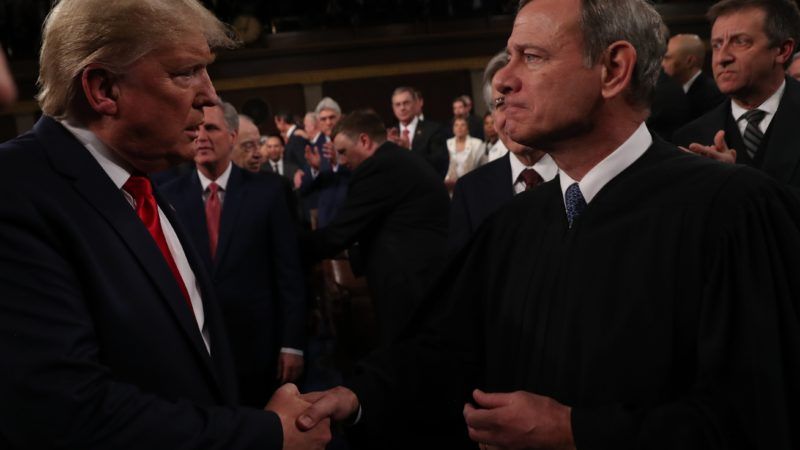Roberts, Gorsuch, and Kavanaugh Reject Trump's Assertion of 'Absolute Immunity' From State Criminal Subpoenas
The Supreme Court weighs the legality of subpoenaing Trump’s financial records.

The U.S. Supreme Court delivered a pair of eagerly awaited decisions today in cases arising from efforts by the Manhattan district attorney and by members of Congress to subpoena the financial records of President Donald Trump and several of his business entities. The cases are Trump v. Vance and Trump v. Mazars USA.
Trump lost big in Trump v. Vance. At issue was a subpoena filed by the New York County District Attorney's Office seeking financial records from Mazars USA, LLP, the longtime accounting firm of both Trump and various businesses tied to him. Trump's lawyers told the Supreme Court that the president should enjoy "absolute immunity" from such state legal actions while in office. As the Court put it, Trump "argues that the Supremacy Clause gives a sitting President absolute immunity from state criminal subpoenas because compliance with those subpoenas would categorically impair a President's performance of his Article II functions."
The Supreme Court resoundingly rejected that position. "Two hundred years ago, a great jurist of our Court established that no citizen, not even the President, is categorically above the common duty to produce evidence when called upon in a criminal proceeding," declared the majority opinion of Chief Justice John Roberts. "We reaffirm that principle today and hold that the President is neither absolutely immune from state criminal subpoenas seeking his private papers nor entitled to a heightened standard of need." In other words, the Manhattan district attorney may ultimately obtain Trump's financial records.
Roberts' opinion was joined in full by Justices Ruth Bader Ginsburg, Stephen Breyer, Sonia Sotomayor, and Elena Kagan.
Justice Brett Kavanaugh, joined by Justice Neil Gorsuch, concurred in the judgment only. They too rejected Trump's sweeping claim of absolute immunity from state criminal subpoenas. But Kavanaugh and Gorsuch also stressed that Trump "may raise [other] constitutional and legal objections to the state grand jury subpoena as appropriate" as the case proceeds in the lower courts.
Justices Clarence Thomas and Samuel Alito voted in dissent.
Trump fared a little better in today's second subpoena case. At issue in Trump v. Mazars was an effort by the House Committee on Oversight and Reform to obtain eight years of Trump's financial records from his accounting firm. The key question was whether the congressional committee had a "legitimate legislative purpose" in seeking those documents. Trump's lawyers insisted that if the House prevailed, future congressional committees would be empowered to go on endless fishing expeditions into the private records of future presidents. "A congressional committee merely needs to say that it is considering legislation requiring presidents to disclose [financial] information of this type," Trump's legal team argued. "Given the temptation to investigate the personal lives of political rivals, legislative subpoenas targeting the private affairs of presidents will become routine in times of divided government."
That argument seemed to resonate with the Court. "Far from accounting for separation of powers concerns, the House's approach aggravates them by leaving essentially no limits on the congressional power to subpoena the President's personal records," said Chief Justice Roberts, whose opinion was joined by Justices Ginsburg, Breyer, Sotomayor, Kagan, Gorsuch, and Kavanaugh. "Without limits on its subpoena powers, Congress could 'exert an imperious controul' over the Executive Branch and aggrandize itself at the President's expense, just as the Framers feared."
But the majority stopped short of actually ruling in Trump's favor. In fact, the justices essentially punted the case back down to the lower courts.
"In assessing whether a subpoena directed at the President's personal information is 'related to, and in furtherance of, a legitimate task of the Congress,'" Roberts wrote, "courts must perform a careful analysis that takes adequate account of the separation of powers principles at stake, including both the significant legislative interests of Congress and the 'unique position' of the President." Roberts then instructed the lower courts to perform that "careful analysis" by remanding Trump v. Mazars "for further proceedings consistent with this opinion."
The upshot of today's two decisions is that the Supreme Court thoroughly rebuffed Trump's most sweeping assertion of executive power while also casting doubt on the House Oversight Committee's broad claim of congressional power.


Show Comments (73)